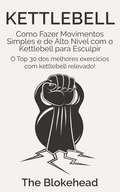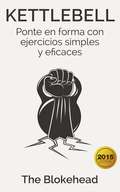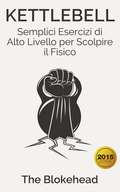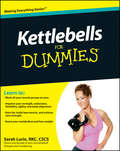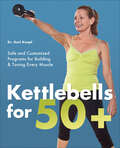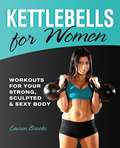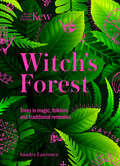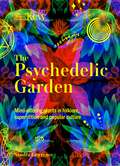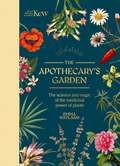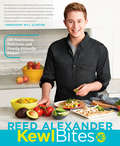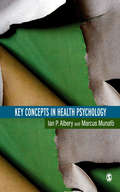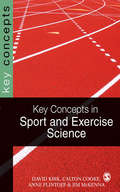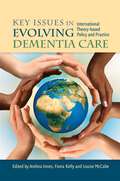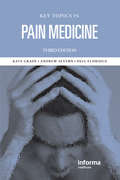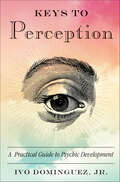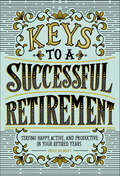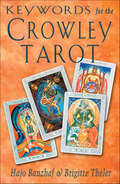- Table View
- List View
Kettlebell: Como Fazer Movimentos Simples e de Alto Nível com o Kettlebell para Esculpir
by The Blokehead Íris Soares JordãoAprenda a esculpir o corpo com o Top 30 dos melhores exercícios com kettlebell.
Kettlebell: Ponte en forma con ejercicios simples y eficaces
by The BlokeheadAntes de empezar con tu rutina de ejercicios es importante que realices un calentamiento de unos tres a cinco minutos que te ayudará a ir subiendo la frecuencia cardíaca poco a poco y a calentar los músculos. Caminar, hacer estiramientos o saltos, pueden ser un buen calentamiento. Hacer ejercicio sin calentar previamente supone exponerse a lesiones y calambres musculares, así como problemas cardíacos. Por lo tanto, asegúrate de realizar un buen calentamiento.
Kettlebell: Semplici Esercizi di Alto Livello per Scolpire il Fisico
by The BlokeheadIl conto alla rovescia inizia qui, partendo da movimenti che si concentrano sull'addome. Ma prima di iniziare la routine di allenamento, assicurati di fare dai tre ai cinque minuti di riscaldamento. Si tratta di semplici movimenti per alzare la frequenza cardiaca e riscaldare i muscoli, come camminare, stretching e saltelli. Se passi direttamente all'allenamento, ti esporrai a lesioni come i crampi muscolari e sarà dannoso anche per il cuore partire subito al massimo. Quindi assicurati di dedicare il giusto tempo al riscaldamento.
Kettlebells For Dummies
by Sarah LurieThe way to a full-body workout with amazing results by mastering kettlebells Have you heard the buzz about the all-in-one strength and cardio workout that works every muscle in the body at once? There's a reason why professional athletes and A-list celebrities are joining the Kettlebells revolution-and now you can, too! With numerous step-by-step photos throughout, Kettlebells For Dummies gives you everything you need to use kettlebells to safely improve strength, endurance, flexibility, joint durability, agility, mobility, athletic movement, and proper body alignment. Whether you're in your teens, 20s, 30s, 40s, 60s and beyond, you'll discover how this fast-growing fitness phenomenon can boost your metabolism and help you lose weight by mastering numerous kettlebell exercises. One of the most effective workouts for burning fat, building lean muscle, and achieving core strength One-hour workout can burn as much as 1,000 calories Named one of the most popular fitness trends in 2009 Whether you're a self-proclaimed gym rat or have never lifted a weight, Kettlebells For Dummies shows you that it's easy to use kettlebells to achieve a full-body workout that yields amazing results.
Kettlebells for 50+: Safe and Customized Programs for Building & Toning Every Muscle
by Dr. Karl KnopfStay young, improve stamina, build strength, and exercise your core with this how-to guide to mastering exercising with kettlebells.Designed to meet the unique needs of active adults, Kettlebells for 50+ presents functional exercises carefully adapted and tested to provide a comprehensive total-body workout. Step-by-step photos and explanatory captions make it easy for anyone from fitness novice to longtime athlete to train smart and stay fit for life.Kettlebells for 50+ offers progressive programs that will:• Improve strength• Foster core stability• Increase hand-eye coordination• Boost mind-body awareness• Enhance sports performance
Kettlebells for Women: Workouts for Your Strong, Sculpted and Sexy Body
by Lauren BrooksGET A STRONG, SEXY, SCULPTED KETTLEBELL BODYWhether you're looking to get in better shape, spice up your exercise regimen or challenge yourself with the ultimate high-intensity workout, kettlebells are the perfect tool to take you to the next level. With over 300 step-by-step photos, Kettlebells for Women presents a solid 12-week program packed with exercises that produce unmatched results for:* burning fat and increasing lean muscle mass* enhancing balance, coordination and flexibility* increasing and developing rock-hard core stability* improving sports performance* shaping legs, back and shoulders* firming and lifting glutesKettlebells for Women teaches the proper way to do primary lifts as well as variations so you can use kettlebells safely and effectively to transform your current workout into a fun, dynamic program for sculpting and strengthening your entire body.
Kew - Witch's Forest: Trees in magic, folklore and traditional remedies
by Sandra Lawrence Royal Botanic KewThere is more folklore, mythology and magic associated with our trees and forests than with any other living things.Known throughout the world as dark and wild places where witches make mischief and eerie creatures dwell, forests are also places of sanctuary for the ancient magic and the most enchanting species of trees.Kew: Witch's Forest is a beautifully illustrated, captivating journey through the magical woodland and its stories, from birch broomsticks and the sacred olive, to alder doorways and the Tree of Life.
Kew - Witch's Forest: Trees in magic, folklore and traditional remedies
by Sandra Lawrence Royal Botanic KewThere is more folklore, mythology and magic associated with our trees and forests than with any other living things.Known throughout the world as dark and wild places where witches make mischief and eerie creatures dwell, forests are also places of sanctuary for the ancient magic and the most enchanting species of trees.Kew: Witch's Forest is a beautifully illustrated, captivating journey through the magical woodland and its stories, from birch broomsticks and the sacred olive, to alder doorways and the Tree of Life.
Kew: Mind-altering plants in folklore, superstition and popular culture (Royal Botanic Gardens, Kew)
by Sandra LawrenceThe ancient Aztecs, the cannabis-smoking farmers of Neolithic China and the Woodstock hippies. Psychoactive plants have been used by different cultures for thousands of years for everything from shamanic rituals to staying awake.From the Royal Botanic Gardens, Kew and Sandra Lawrence, Psychedelics is a fascinating exploration of the mind-altering plants that for centuries have helped shape the way we see the world. Packed with expert text and stunning botanical illustrations from the Kew archive, this book delves into the folklore, cultural relevance and botanical background of remarkable plants that have long been leveraged to hallucinogenic effect.A gorgeous gifty package, this book is both a beautifully illustrated botanical history and quirky cultural reference for plant lovers everywhere.
Kew: Mind-altering plants in folklore, superstition and popular culture (Royal Botanic Gardens, Kew)
by Sandra LawrenceThe ancient Aztecs, the cannabis-smoking farmers of Neolithic China and the Woodstock hippies. Psychoactive plants have been used by different cultures for thousands of years for everything from shamanic rituals to staying awake.From the Royal Botanic Gardens, Kew and Sandra Lawrence, Psychedelics is a fascinating exploration of the mind-altering plants that for centuries have helped shape the way we see the world. Packed with expert text and stunning botanical illustrations from the Kew archive, this book delves into the folklore, cultural relevance and botanical background of remarkable plants that have long been leveraged to hallucinogenic effect.A gorgeous gifty package, this book is both a beautifully illustrated botanical history and quirky cultural reference for plant lovers everywhere.
Kew: The science and mythology of medicinal plants (Royal Botanic Gardens, Kew)
by Emma WaylandFor centuries we have harnessed the ancient wisdom of botanical healing, with plants used for a multitude of remedies that nurture both body and soul.Kew: The Apothecary's Garden is a fascinating exploration of nature's pharmacy and the healing power of plants, from soothing hops, chamomile and valerian, and invigorating guarana, maca and ginseng, to the infection-fighting turmeric and tea tree and the immunity-boosting turkey tail mushroom. Herbal remedies, natural tinctures, and the historical and botanical background of plants are revealed through expert text and beautiful illustrations from the renowned Kew archive.This curious history of plants that heal describes the incredible properties of over 60 species. Exploring the original folk remedies they inspired and the science behind them, this is the weird and wonderful story of how humans have harnessed nature's apothecary.
Kew: The science and mythology of medicinal plants (Royal Botanic Gardens, Kew)
by Emma WaylandFor centuries we have harnessed the ancient wisdom of botanical healing, with plants used for a multitude of remedies that nurture both body and soul.Kew: The Apothecary's Garden is a fascinating exploration of nature's pharmacy and the healing power of plants, from soothing hops, chamomile and valerian, and invigorating guarana, maca and ginseng, to the infection-fighting turmeric and tea tree and the immunity-boosting turkey tail mushroom. Herbal remedies, natural tinctures, and the historical and botanical background of plants are revealed through expert text and beautiful illustrations from the renowned Kew archive.This curious history of plants that heal describes the incredible properties of over 60 species. Exploring the original folk remedies they inspired and the science behind them, this is the weird and wonderful story of how humans have harnessed nature's apothecary.
KewlBites: 100 Nutritious, Delicious, and Family-Friendly Dishes
by Reed AlexanderAs a busy teen star, Reed Alexander's life is a balancing act. Several years ago, as he juggled career commitments and school, he lost sight of how to eat right, became overweight, and as a result, was exhausted and lethargic. Too tired to keep up with his hectic schedule, he decided to reclaim his health by changing his diet. A can-do guy, his first step was to learn how to cook for himself. Unable to find any recipes suited to a teenager's tastes, he rolled up his sleeves and set to work in his kitchen, developing healthy versions of the foods he loves. Along the way, he became a dedicated cook, sharing his culinary discoveries with his fans and friends on his website, KewlBites.com. Since then, Alexander has gained a cultlike following of both teen cooks and their parents. Inspired by the number of lives he has touched, Alexander has created 100 slimmed down, kid-tested, mother-approved alternatives for the foods teens love. In KewlBites, Reed Alexaner improves the health profile of such standard teen fare as sliders, chips, chicken fingers, tacos and fries, and he aims to expand the dinner menu to include such dishes as a Margherita Frittata, Oriental Chop Slaw, and Kewl and Breezy Shrimp Rolls. Throughout, he shares the tips, tricks, and methods he used to strip his favorite dishes of their unhealthy ingredients and replace them with flavorful, nourishing ones. He also offers up advice on how to make a shopping list, navigate the grocery store, and choose the freshest ingredients possible.
Key Concepts in Health Psychology
by Dr Ian Albery Dr Marcus MunafoWhile current textbooks in health psychology offer the reader some conceptual reasoning about different aspects of the discipline, there is no one source which provides an accessible, navigable and cross-referenced analysis of the major models and ideas in health psychology. Key Concepts in Health Psychology provides a `one stop' analysis of key issues, theories, models and methods in contemporary health psychology. It enables the reader to engage with a full range of approaches and methods in the field, and importantly to be able to appreciate the relationships between these.
Key Concepts in Sport and Exercise Sciences (SAGE Key Concepts series)
by David Kirk Jim Mckenna Anne Flintoff Carlton B. Cooke'A very useful introduction to the key concepts in five main areas of study in sport and exercise science. The multi-disciplinary nature of the book is particularly attractive as it means that it can be used to support students studying a range of sport and exercise courses and modules. Furthermore, the chapters are concise, informative, written in an accessible style, and provide a good balance between theory and application to practice, making it a very interesting and relevant read' - Dr Lorraine Cale, Loughborough University This book provides students and scholars with a fail-safe guide to the key concepts in the field of Sport & Exercise Science. Intelligently cross-referenced entries provide a sound map of the multi-disciplinary demands of sport related courses including physical and biological sciences, social science and education. The entries use clear definitions, examples and suggestions for further reading to explore each discipline and are: " Comprehensive " Lucid " Pertinent to study needs " Practically relevant David Kirk is Professor in Physical Education and Youth Sport Carlton Cooke is Professor in Physical Education Anne Flintoff is Reader in Physical Education Jim McKenna is Professor in Physical Activity and Health All at the Carnegie Faculty of Sport and Education, Leeds Metropolitan University.
Key Issues in Evolving Dementia Care: International Theory-based Policy and Practice
by Sube Banerjee Chris Johnson Fiona Kelly June Andrews Amit Dias Scott Dudgeon Louise Mccabe Nicola Coley Charles Scerri Victoria Traynor Anthea Innes Loren De Vries Sandrine Andrieu Roxanna Johnson Marie-Jo Guisset Paulina Szymczynska Emma Reynish Claudine BerrFocusing on theoretical, policy and practice issues which are predicted to become fundamental priorities in the near future, the contributors to this important book examine how dementia care works around the globe. They explore the theory underpinning dementia care, the applications of this theory in the latest dementia care research and how this research is influencing and shaping practice. The contributors are leading practitioners, policy influencers and researchers who analyse case studies from the UK, the USA, Canada, Australia, India, France and Malta with the aim of encouraging a dialogue and exchange of interdisciplinary initiatives and ideas. Their insights into how policy and dementia strategies are developed, and the range of approaches that can be taken in dementia care practice, are a positive step towards ensuring that the needs of people with dementia around the world are met, both now and in the future. This book makes essential reading for practitioners, researchers, policy makers and students in the field of dementia care.
Key Topics in Pain Management
by Kate M. Grady Andrew M. SevernThe Third Edition of this best-selling guide to the Key Topics in Chronic Pain has now expanded its remit to include material on acute pain management also. In addition, the existing material has been completely updated to reflect new activity in the field of anti-inflammatory drugs and physiotherapy, amongst other topics.
Key to Health
by M. K. GandhiFor the benefit of the readers of the Indian Opinion (South Africa), I wrote a few articles under the heading Guide to Health in or about the year 1906. These were later published in book form.
Keys to Perception: A Practical Guide to Psychic Development
by Ivo DominguezMany different systems and traditions of magic, divination, spirituality, and esoteric religion exist, but at their core, they share the need for practitioners to safely and successfully experience the reality that lies beyond the physical senses.Keys to Perception: A Practical Guide to Psychic Development is a collection of proven and tested methods, rituals, and systems that will help you deepen and clarify your capacity to sense and understand the rich worlds beyond the veils of the ordinary. The material in this book derives from decades of work by the author and his students. Dominguez offers the reader practical techniques for increasing psychic aptitude and ability. Methods featured include chanting and working with crystals, chakras, oils, herbs, and potions, as well as a variation on the Middle-Pillar Ritual.
Keys to a Successful Retirement: Staying Happy, Active, and Productive in Your Retired Years
by Fritz GilbertYou're finally retired! Learn how to make these the best years of your life.Congrats on your retirement! But now what will you do with all that free time? With Keys to a Successful Retirement, you'll discover everything you need to know to get your retired years off to a great start.Covering topics like finances, embracing your passions, and dealing with feelings of aimlessness, grief, and depression that may crop up, this in-depth guide to retired living answers all the burning questions you want to ask—as well as those you're afraid to. Take a complete look at your newfound freedom and explore what it really means to have a successful retirement.This in-depth guide includes:Essential basics—Make sure you're retirement ready with advice for managing your savings, dealing with healthcare, staying fit, and more.Handling tough times—Dig into the more challenging aspects of retirement, like how to best handle the effects it can have on your mental health.Be your own boss—Get guidance that teaches you how to decide what you want your retirement to be and how you can lean into the things that you love.An exciting new chapter of your life is starting—get a helping hand ensuring it's the best it can be!
Keywords for the Crowley Tarot
by Hajo Banzhaf Brigitte ThelerThis easy-to-use reference provides a handy dictionary and overview so you can readily check card meanings and interpret the symbols for different occasions. Included are the number, glyph, astrological attribute, general meaning, what the card encourages what it warns against, and how you can use it if you draw it as your card for the day or card for the year. sure to become a classic in every tarot library! Bibliography. Index. Illustrated.
Khel Yatra (Physical Education And Well-being Textbook) class 6 - NCERT - 25
by National Council of Educational Research and TrainingKhel Yatra is a Physical Education and Well-being textbook designed for Grade 6 students by NCERT, aligning with the National Curriculum Framework for School Education (NCF-SE) 2023. The book aims to promote holistic development by integrating physical fitness, emotional balance, and social well-being. It introduces students to the joy of movement, teamwork, and discipline through engaging activities and traditional Indian games. The textbook is divided into five main units—Importance of Physical Education and Well-being, Motor Fitness, Fundamental Skills of Kho-Kho, Fundamental Skills of Handball, and Yoga. Each unit focuses on developing specific physical and mental skills. Students learn endurance, strength, flexibility, and balance while also understanding teamwork, safety, and empathy through interactive exercises and circle time reflections. The inclusion of Indian sports like Kho-Kho helps children connect with cultural roots, while Handball enhances coordination and team spirit. Yoga, being a vital part of the curriculum, teaches self-discipline, focus, and mindfulness through Asanas, Pranayama, and Dhyana. The book also emphasizes inclusion, gender equality, and respect for others, encouraging students to stay fit, confident, and compassionate. Overall, Khel Yatra provides a structured, joyful, and holistic approach to physical education, preparing students for a healthy and active lifestyle.
Khel Yatra (Physical Education And Well-being Textbook) class 8 - NCERT - 25
by National Council of Educational Research and TrainingKhel Yatra: Physical Education and Well-being is NCERT’s Grade 8 textbook developed under the National Curriculum Framework for School Education (NCF-SE) 2023 to promote holistic physical, mental, and emotional development. The book blends theory and practice through six comprehensive units—Foundations of Physical Education, Physical and Motor Fitness, Athletics, Table Tennis, Volleyball, and Yoga—emphasising fitness, teamwork, and mindfulness. It integrates scientific concepts from physics and biology with interactive games and reflective “circle time” discussions to cultivate discipline, resilience, inclusivity, and respect. By aligning with NEP 2020’s vision of experiential and value-based education, Khel Yatra encourages students to explore physical activity as a joyful, lifelong practice for health, well-being, and social harmony.
Khel Yog (Sanskrit language) class 3 - NCERT - 25: खेलयोग ३रीं कक्षा - एनसीईआरटी - २५
by Rashtriy Shaikshik Anusandhan Aur Prashikshan Parishadखेल और योग कक्षा 3 के विद्यार्थियों के लिए एक उपयोगी पुस्तक है जो उनके शारीरिक, मानसिक और नैतिक विकास को बढ़ावा देती है। यह पुस्तक खेल-कूद, योगाभ्यास और शारीरिक गतिविधियों के माध्यम से विद्यार्थियों में अनुशासन, एकता, आत्म-नियंत्रण और सहयोग की भावना को विकसित करती है। इसमें सरल भाषा में विविध खेलों, योगासनों और व्यायामों का परिचय दिया गया है ताकि बच्चे इन्हें सहज रूप से समझ सकें और अभ्यास कर सकें। पुस्तक में चित्रों, गतिविधियों और समूह कार्यों के माध्यम से विद्यार्थियों की भागीदारी और रुचि को बढ़ाया गया है। यह पाठ्यक्रम न केवल स्वास्थ्यवर्धक जीवनशैली की दिशा में प्रेरित करता है, बल्कि विद्यार्थियों को सक्रिय, आत्मविश्वासी और स्वस्थ नागरिक बनने के लिए भी प्रेरित करता है।
Khel Yog (Sharirik Shiksha aur Arogya) class 3 - NCERT - 25: खेल योग (शारीरिक शिक्षा और आरोग्य) ३रीं कक्षा - एनसीईआरटी - २५
by Rashtriy Shaikshik Anusandhan Aur Prashikshan Parishadखेल और योग कक्षा 3 के विद्यार्थियों के लिए एक उपयोगी पुस्तक है जो उनके शारीरिक, मानसिक और नैतिक विकास को बढ़ावा देती है। यह पुस्तक खेल-कूद, योगाभ्यास और शारीरिक गतिविधियों के माध्यम से विद्यार्थियों में अनुशासन, एकता, आत्म-नियंत्रण और सहयोग की भावना को विकसित करती है। इसमें सरल भाषा में विविध खेलों, योगासनों और व्यायामों का परिचय दिया गया है ताकि बच्चे इन्हें सहज रूप से समझ सकें और अभ्यास कर सकें। पुस्तक में चित्रों, गतिविधियों और समूह कार्यों के माध्यम से विद्यार्थियों की भागीदारी और रुचि को बढ़ाया गया है। यह पाठ्यक्रम न केवल स्वास्थ्यवर्धक जीवनशैली की दिशा में प्रेरित करता है, बल्कि विद्यार्थियों को सक्रिय, आत्मविश्वासी और स्वस्थ नागरिक बनने के लिए भी प्रेरित करता है।
